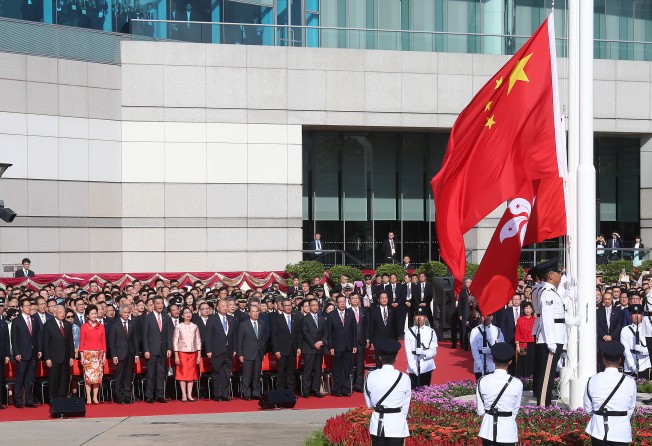Concerns over planned law to prevent abuse of Chinese national anthem in Hong Kong
Pan-democrats say law must be amended for Hong Kong to ensure city’s rights and freedoms are upheld

A proposed mainland law to curb disrespect for China’s national anthem is set to be applied in Hong Kong, paving the way for strict punishment for those who mock or parody the official song.
Concerns were immediately raised by pan-democrats after The Beijing News reported on Monday that the executive body of China’s top legislature would officially propose inserting a national anthem law into Annex III of the Basic Law, the city’s mini-constitution, at its bimonthly meeting in October.
At the heart of the anxieties was whether the same severity of punishments would be extended to the city, which has different standards in guaranteeing people’s rights and freedoms.
When it meets in October, the National People’s Congress Standing Committee will be looking at the draft law, which was a given second reading on Monday. There is no clear date on when it will be passed yet.
The draft law will ban people from playing the March of the Volunteers at events such as funerals or using it as background music in public places.
Malicious revisions to the lyrics or derogatory performances may also be punished under the proposed legislation by up to 15 days in detention.
The legislation also bars the use of the anthem in commercial advertisements, while those at events are required to stand up straight solemnly when the anthem is played.
Such a ban means Hong Kong soccer fans, who booed during the anthem ahead of the World Cup qualifiers in 2015, would have been breaking the law had it been in effect then.
In 2015, hundreds of locals jeered, turned their backs and held up white signs saying “boo” in English when the anthem was played at the qualifying match between Hong Kong and China in Mong Kok Stadium.
Hong Kong’s soccer governing body was eventually fined by Fifa after the incident, which broke out during the height of anti-mainland sentiments in the city.
The proposed law also covers education and promotion of the song. It states that the song should be included in primary and secondary school textbooks, while citizens are encouraged to sing the anthem on proper occasions to “express patriotism”.
Civic Party lawmaker Dennis Kwok said Hong Kong must adapt to the draft to produce a local law as many of the requirements would not be acceptable in the city.
“The 15-day detention does not apply in Hong Kong, whereas the city also has a very different education system from the mainland,” he said.
“A local law is a must to guarantee the rights and freedoms of Hongkongers.”
Kwok noted that the introduction of the law on the national flag in Hong Kong had gone through a local legislation process and it would be a “retrogression” if there was no such local adaptation this time.
Basic Law Committee member and legal scholar at University of Hong Kong, Professor Albert Chen Hung-yee, said he believed Hong Kong would make a local ordinance to implement the law after it was put into Annex III of the Basic Law.
“The penalty provisions in the national law can be adapted to fit the Hong Kong legal system. This was done in the case of the local ordinance to implement the national flag law,” he told the Post.
Executive councillor and lawmaker Wong Kwok-kin, of the Federation of Trade Unions, said he believed the rise of pro-independence sentiments, alongside the insults young people hurled at the anthem during the soccer matches, had irritated Beijing and eventually led to the development today.
But he also agreed it was better for Hong Kong to enact its own law after the national law was added in Annex III, in order to make it more specific in implementation.
Under the “one country, two systems” formula that guarantees Hong Kong’s freedoms, for a national law to take effect locally it has to be inserted into Annex III of the Basic Law.
Tian Feilong, a Basic Law academic at Beihang University in Beijing, said the incorporation of the anthem law into Hong Kong’s mini-constitution “is a measure to rule Hong Kong according to laws and deepen national education and recognition for the country”.
A number of laws were added to the list in Annex III of the Basic Law of Hong Kong and applied with effect from 1 July 1997. They were laws on the national flag, national emblem, the garrisoning of Hong Kong and regulations concerning consular privileges and immunities.
The office of Chief Executive Carrie Lam Cheng Yuet-ngor did not respond to the Post’s enquiries on whether the government would move a bill to Legco when the national law was passed and whether Hong Kong had room to make changes to the law.
Additional reporting by Stuart Lau in Beijing